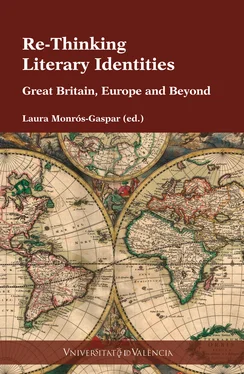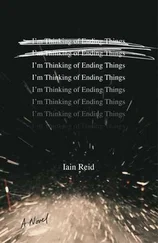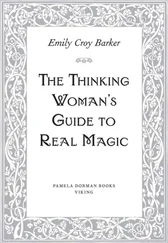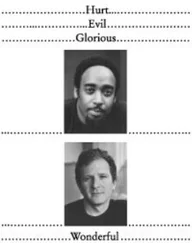The drama’s cosmopolitan sensibilities (see Rebellato 2009: 71-84) are evident too, in the song which Prudencia chooses to sing at the play’s close. We first encounter the play’s protagonist as a ballad-scholar who is prudishly unwilling to risk her own sense of self by singing but, transformed as a result of her supernatural adventures, she finally approaches the mic in the play’s closing moments. Greig’s stage directions state that ‘The song she sings is full of yearning and loss, the song she sings is a love song’ (2011: 83), and yet her chosen tune is not a ballad in the conventional sense. Instead, Greig’s heroine, who has formerly fumed at Colin for the crassness of his Kylie Minogue ringtone (21-2), sings the international commercial pop hit (possessed of an infernally catchy chorus) ‘I Can’t Get You Out Of My Head’ (83). This is an important moment for the play’s exploration of the ballad form, and its potential efficacy within contemporary contexts. For Greig, it appears that a ballad is not defined by its historical provenance, nor by meticulous antiquarian editing, but by the fact that it’s a song which ordinary people can sing together, in a collective voicing expressive of the triumphs and travails of shared experience. While Scott, in the Minstrelsy of the Scottish Border , turns songs into literary texts, Greig’s play turns pop songs into ballads, explicitly inviting spectators to become participants in his play’s inclusive music-making.
As well as being uproarious good fun, this shared music-making has a political value. In his 2007 essay ‘rough theatre’, Greig argues that:
The very form of theatre is all about people coming together in a local physical space—one of the few remaining public spaces—and experiencing something together. […] So even before a word has been spoken on stage, the theatre has already offered a grain of resistance to the frictionless movement of capital. It cannot efface its humanity. It cannot erode its locality (Greig 2007: 219).
This analysis chimes strongly with Mairi McFadyen’s recent writings on the effect (and affect) of live ballad performance, in which she fuses insights from ethnomusicology and phenomenology in order to argue that the ‘potential power of the song experience depends on the physical presence of the members of a group and involves their collective participative energies’ (2013: 160). For Greig, the co-presence and co-creation demanded by the performance event is part of the political radicalism offered by live theatre, potentially igniting new shared energies among each unique, collectively imagining, audience. This is, in Dan Rebellato’s phrase, ‘political theatre for a globalising world’ (2002: xxi), stressing the ineradicable localism of live performance, and placing a positive value on what might be termed ‘particularity in general’ (2016: 17) Since 2011, The Strange Undoing of Prudencia Hart has toured not only across Scotland, England, and Ireland, but also to the United States, Canada, Brazil, Australia and New Zealand, stressing the possibility that the kinds of temporary, convivial communities evoked by the play’s unorthodox approximations of traditional ballad performance might be activated in a cosmopolitan range of locales and contexts. Greig’s ballad-inspired dramaturgy is self-consciously subversive of the kinds of nation-building myths associated with nineteenth-century ballad collecting, while being unashamedly idealist in its invitation to each unique audience to experience the pleasures (and, perhaps, radical potentials) of singing, joking, and imagining together. As Prudencia gradually comes to realize (Greig 2011: 65-7), fantastical ballads are not just literary/historical artefacts, but unpredictable and shape-shifting imaginative territories, in which personal and collective identities can be subverted, challenged and potentially transformed (Harrop 2017).
The Bloody Great Border Ballad Project (2013)
The Strange Undoing of Prudencia Hart was only the first of a series of high-profile theatre projects, during the run-up to the Scottish Independence Referendum, to return to traditional ballads as a medium for exploring changing identities within a post-devolution Great Britain. In particular, theatre-makers seem to have been attracted to the popular performance dynamics associated with the traditional ballad as a means of encouraging active, social interactions between different artists, between performers and audiences, and between audience members. The Bloody Great Border Ballad Project was one such project, developed by an English arts organization (the Newcastle-based Northern Stage) but created and performed in Scotland (at the Edinburgh Fringe in 2013). Speaking at the opening of Northern Stage’s residency at St. Stephen’s, the company’s Edinburgh-born artistic director Lorne Campbell spoke of the city’s festival as a place for audiences and artists ‘of every race, colour and creed […] to meet, to barter themselves, to change and be changed’, celebrating this as ‘a space in which we are invited to imagine and experience ourselves in new liberating and terrifying ways’ (Campbell 2013). The Bloody Great Border Ballad Project responded to this challenge by inviting both artists and audiences to participate in the creation of a new ballad, giving voice to a wide range of views surrounding questions of national identity, and to a mood of mixed anxiety and anticipation in relation to the 2014 Referendum.
At each performance, two of a core company of six artists (Kieran Hurley, Chris Thorpe, Cora Bissett, Alex Kelly, Lucy Ellinson and Daniel Bye) would share their own new ‘ballads’. Few of these were literally ballads—the artists’ offerings including songs, stories, a politically-inflected variant upon the Japanese game Hyakumonogatari Kaidankai (‘Gathering of One Hundred Supernatural Tales’), and something that resembled an astrophysics lecture (Love 2013)—though all articulated distinctive points of view on themes of identity, division, and independence. This was followed by a performance from one of a series of guest artists, each of whom was invited to add their own verse to a new ballad, which grew and evolved incrementally over the course of Northern Stage’s Edinburgh residency. This collectively-authored ballad began with a verse written by Aly Macrae (musician, singer, actor, and stalwart of multiple revivals of The Strange Undoing of Prudencia Hart ), set in the near future. Macrae’s narrative imagines a baby, born on the same night that Scotland declares its independence from the United Kingdom, discovered floating in a basket down the river Tweed (which has historically acted as an English/Scottish borderline). This initial offering also included a chorus which was sung before and after each new verse, incorporating the traditional ballad device of a repeating line: ‘Let’s see what the foundling does now’ (Part 1).
From this initial scenario, each subsequent contributor added a chapter to the adventurous life of this waterborne infant, tracking her development from artist to activist, from fugitive to figurehead, as mother and grandmother, through transformations even more various than Tamlane’s. The sequential authoring and sharing of these successive verses meant that each development was a surprise, each new contributing voice potentially taking the foundling’s story somewhere unprecedented, within a framework that explicitly invited such imaginative flexibility. Company member Kieran Hurley recalls that:
[…] the rehearsals in themselves were like a céilidh … everyone had their bit that they did and we knew the bit that the community had brought to the table, and then we’d welcome in a new guest into the ‘living room’ where our céilidh was happening and everyone would hush and turn to the new guest because the new guest was going to do a ‘turn’. (Hutton 2013).
Читать дальше










